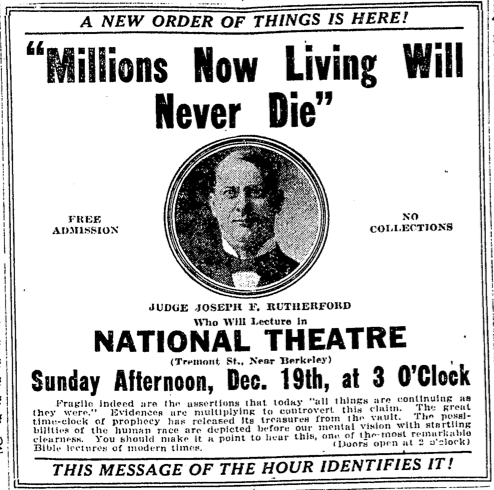
Why Are Jehovah’s Witnesses Persecuted?
Mathew N. Schmalz
Picture by Jace Grandinetti on Unsplash.
Since 2017, the Russian government has attempted to “liquidate” Jehovah’s Witnesses as a religious organization. Branding Jehovah’s Witnesses an “extremist” group akin to a terrorist organization, the Russian government has confiscated the organization’s property. Witnesses have been beaten and jailed.
This persecution has been condemned by the European Court of Human Rights, which recently imposed fines on the Russian government. The treatment of Jehovah’s Witnesses has also drawn worldwide media attention, with The Washington Post running a series of editorials harshly critical of Russia’s actions.
The violence now directed against Jehovah’s Witnesses has brought a rare moment of sympathetic attention to a group that is often denigrated as a cult.
Jehovah’s Witnesses are no strangers to persecution. From the United States to Nazi Germany, from Malawi and Mozambique to Singapore and South Korea, Jehovah’s Witnesses have suffered censure, imprisonment, and even death.
There are nearly 9 million members of Jehovah’s Witnesses worldwide. In the United States, Jehovah’s Witnesses have one of the most ethnically and racially diverse memberships of any religious group.
Many homeowners have encountered a member of Jehovah’s Witnesses on their doorstep but few are familiar with the organization’s overall belief system and history.
So who are Jehovah’s Witnesses and why have they been persecuted for over a century?
Jehovah’s Witness’ Beliefs
The organization now called Jehovah’s Witnesses was originally established by Pastor Charles Taze Russell (1852-1916) in Pittsburgh in 1872 as a group of Bible students, which later became officially known as Zion’s Watch Tower Tract Society and later as The Watch Tower Bible and Tract Society of Pennsylvania.
Russell was inspired by Seventh Day Adventist preachers who, he is reported to have said, possessed more knowledge than representatives of mainline churches. Through his massive six volume explication of the Bible, Studies in the Scriptures, along with the periodical Zion’s Watch Tower and Herald of Christ’s Presence, Russell charted out a complex timeline that identified 1874 as the year of Christ’s invisible return and foresaw 1914 as the year that would usher in a thousand year period of peace and tranquility — a millennium.
Russell’s specific predictions did not come to pass, though his expectation of a millennial age remained along with revisions to his interpretations of Biblical prophecies. In succeeding Watch Tower chronologies, 1914 and World War I marked the beginning of the end of “Gentile Times” that would culminate in the destruction of worldly governments and the establishment of direct divine rulership over the entire world.
Recently, the timing of the “New System of Things” has been altered through the “New Light” understanding of Biblical revelation as progressive and thus subject to greater clarity or refinement over time. This perspective acknowledges that, contrary to original expectations, the generation that experienced the events of 1914 and World War I has passed away without seeing the dawn of a new golden age.

Russell was succeeded by J. F. “Judge” Rutherford (1869-1942). Rutherford was a harsh and vocal critic of established Christian denominations, which he described as a “snare and a racket.” It was Rutherford who coined the term “Jehovah’s Witnesses” in the 1930s and who extended and elaborated — controversially for some original members — many of the beliefs that shaped Russell’s Biblical worldview. Most significantly for Jehovah’s Witnesses’ self-understanding, Rutherford proclaimed the organization to be a “theocracy”—Jehovah God’s chosen earthly vehicle for salvation.
Jehovah’s Witnesses hold beliefs that distinguish them from mainline Christians. They do not believe in the Trinity as the union of God the Father, Christ Jesus the son, and the Holy Spirit. Instead, Jesus is “Michael the Archangel” and “the greatest man”; the Holy Spirit is God’s “active force.” Jehovah, an English rendering of YHWH, is taken to be God’s personal name.
Jehovah’s Witnesses do not believe in hell or the existence of the soul — in their belief system, the dead are actually “asleep,” waiting for the resurrection. Those who have not been faithful to Jehovah will “suffer eternal destruction.”
But the Witnesses do not believe that Jehovah will destroy the Earth; He will cleanse it. After the worldwide battle of Armageddon or Har-magedon, the “New Order” will be established. The Earth will be ruled from heaven by Jesus along with the 144,000 members of “the little flock.” Remaining faithful Christians—the survivors of Armageddon and the resurrected dead—will live on an Earth that will be returned to its pristine condition.
Like many Christian denominations, Jehovah’s Witnesses do believe that the Bible is without error and a sure guide to salvation. Still, in the view of most Christian churches, Jehovah’s Witnesses are not Christians at all. In response, Jehovah’s Witnesses assert, as Rutherford forcefully and publicly did, that all other Christian denominations are false and not pleasing to Jehovah God.
Persecution and Religious Freedom
Jehovah’s Witnesses reject many common social and religious customs on Biblical grounds. They do not celebrate Christmas or Halloween and argue that many practices associated with Easter, and with “Christendom” in general, are actually “pagan” in origin —including wearing a cross or crucifix. They also do not celebrate birthdays nor do they consent to blood transfusions. Most significantly, while they do pay taxes, Jehovah’s Witnesses do not serve in the military and do not salute the flag. Worldly governments are to be “respected” but have only “limited authority.” Jehovah’s Witnesses believe they owe total allegiance to Jehovah God alone. This social separation and political neutrality has provided the pretext for much of the persecution that Jehovah’s Witnesses have suffered.
In the United States, Witnesses were jailed for refusing to serve in the armed services. J. F. Rutherford himself was arrested for sedition and violation of the Espionage Act in 1918 and sentenced to twenty years in prison, though he and his co-defendants were exonerated in 1920. It was not until 1955 that the Supreme Court would grant conscientious objector status to Jehovah’s Witnesses in Sicurella v. United States. Anthony Sicurella’s attorney, Watch Tower lawyer Hayden C. Covington, argued that his client’s faith would prohibit him from participating “in carnal warfare of this world” since he was “already in the Army of Christ Jesus.” Interestingly, the government argued that because Sicurella was ready to fight at Armageddon, he was not truly a pacifist. The government’s argument was rejected by the Court.
Jehovah’s Witnesses were also stigmatized for refusing to salute the flag. The Supreme Court held in a 1940 case, Minersville School District v. Gobitis, that students could be expelled for not saluting the flag. Three years later, however, the Court reversed itself and ruled in West Virginia State Board of Education v. Barnett that no one could be forced to salute the flag or say the Pledge of Allegiance in violation of their religious beliefs.

In Nazi Germany, persecution was murderous. In his famous 1938 sermon, Fascism or Freedom, J. F. Rutherford called totalitarianism “the work of the Devil” and specifically denounced Adolf Hitler as Satan’s “representative.” By that time, Jehovah’s Witnesses had already been banned in Germany. The Gestapo compiled a registry of Jehovah’s Witnesses and approximately 8,000 Witnesses were sent to concentration camps, where at least 1,000 died. An inverted purple triangle marked them as enemies of the Nazi state.
In the 1960s and ‘70s, Jehovah’s Witnesses’ neutrality was seen as a challenge to the nationalist agenda of Malawi’s dictator, Hastings Kamuzu Banda. Witnesses were killed in pogroms carried out by the Youth League of the Malawi Congress Party; those Witnesses who fled to Mozambique were held in internment camps where scores died.
Jehovah’s Witnesses continue to be imprisoned in countries, such as Singapore, which do not have laws protecting conscientious objector status. In South Korea, for example, nearly 19,000 Jehovah’s Witnesses have been jailed for refusing the draft.
Present-day persecution in Russia follows the historical pattern of authoritarian and nationalistic governments singling out Jehovah’s Witnesses, with their distinctive beliefs and practices, as dangers to the integrity of the nation state.
Cult Controversies
While Jehovah’s Witnesses have many aspects that set them apart, they also have activities that make their organization quite public. Jehovah’s Witnesses can be aggressive proponents of their beliefs and fierce critics of other religious groups. Not only do Jehovah’s Witnesses hand out copies of Watchtower and Awake! magazines on street corners, they also go door to door and keep careful records of their evangelistic work.
The practice of distributing literature and going door to door was challenged in numerous legal cases in the 1930s and 40s but the Witnesses most often prevailed. Even as recently as 2002, an Ohio anti-solicitation law that targeted Jehovah’s Witnesses was struck down 8-1 by the Supreme Court.
But in addition to suspicions raised by their political neutrality and evangelism, Jehovah’s Witnesses confront perceptions that their organization is a “cult.”
Critics and criticisms of Jehovah’s Witnesses are many. Ex-members accuse the organization of having an almost totalitarian internal culture. Jehovah’s Witnesses practice “dis-fellowshipping,” the expulsion and shunning of members for a variety of offenses, which has been described as cruel and abusive. The prohibition against blood transfusions provokes anger among ex-Witnesses and dismay and incomprehension among outside observers. Most recently, Jehovah’s Witness branches in Australia have been investigated and found to have concealed child abuse.

To be sure, being a Jehovah’s Witness requires a great amount of time and dedication. Witnesses are required to attend at least two weekly meetings in Kingdom Hall, as well as larger assemblies and conventions during the year. They also have the practice of worshiping at least once a week at home and devote hours each week to Bible study, both privately and in groups. They also must engage in door to door or street corner evangelization — and now letter writing — to be considered active members of the organization, though their public outreach has been curtailed until recently due to the COVID-19 pandemic. The specific criticism of the organization as a “cult” reflects the perception that it is not a “legitimate religion” but an extremist group that demands complete obedience and practices coercion, even mind control.
While the word “cult” is often heard nowadays, most academics find the term vague and prejudicial, especially when combined with tenuous allegations of “brainwashing.” Some scholars of new religions do use the category “cult” to describe groups with high levels of commitment and distinctive structures of belief, but that perspective is quite different from the reductive connotations of religion (“good”) and cults (“bad”).
Many of the criticisms directed against Jehovah’s Witnesses could also be aimed at more socially integrated and accepted groups. For example, the military has an authoritarian structure based on obedience and severe restrictions on behavior and speech, while the Catholic church and the Southern Baptist Convention have also covered-up sexual abuse in their ranks. Political parties aggressively seek to enlarge their constituencies by canvassing and going door to door. But these organizations aren’t described as “cults.”
Taken to an extreme, calling a group a “cult” can be used as a pseudo-rationale for denying religious liberty to otherwise law-abiding members of new and alternative religions. The experience of Jehovah’s Witnesses shows that being labeled a “cult” has severe—even deadly—consequences indeed.
Witnesses are now looking to the prophecies about “The King of the North,” given in the Bible’s Daniel 11, to understand how war in Ukraine and suffering in Russia relate to the final attack of God’s enemies at the war of Armageddon. Ironically, the persecution that Jehovah’s Witnesses continue to experience confirms a crucial element of their belief system: worldly governments are corrupt and only Jehovah God can bring true justice to humankind.♦

Mathew N. Schmalz is a professor of religious studies at the College of the Holy Cross, Worcester, MA. In addition to his writings on new religions, his memoir, Mercy Matters, discusses a formative friendship with a Jehovah’s Witness family.
Recommended Citation
Schmalz, Mathew N. “Why Are Jehovah’s Witnesses Persecuted?” Canopy Forum, September 16, 2022. https://canopyforum.org/2022/09/16/why-are-jehovahs-witnesses-persecuted/

